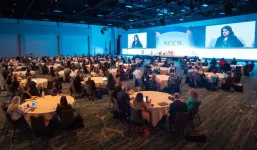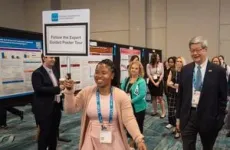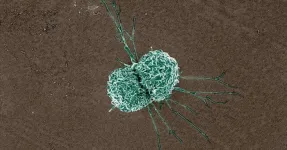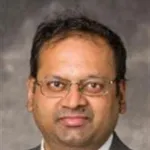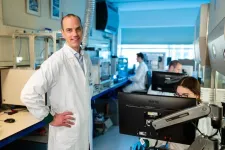(Press-News.org) PLYMOUTH MEETING, PA [April 11, 2024] — The National Comprehensive Cancer Network® (NCCN®)—an alliance of leading cancer centers—hosted more than 1,700 oncology professionals during the NCCN 2024 Annual Conference on April 5-7. The yearly meeting includes opportunities for care providers to interact with world-renowned specialists on the latest evidence-based expert consensus recommendations for delivering high quality, patient-centered cancer care. Sessions focused on practical applications for improving care at every level, including clinical and administrative tracks, patient perspectives, and pressing policy issues.
“The NCCN Annual Conference has always been one of my favorite events, because it is an opportunity to learn about both the clinical and administrative aspects of cancer care delivery with practical things I can take home and immediately apply,” said Crystal S. Denlinger, MD, Chief Executive Officer, NCCN, who has been attending since her time as an oncology fellow, long before joining the organization. “Clinical practice guidelines and continuing education events such as NCCN’s Annual Conference democratize care and disseminate knowledge. They enable providers to know what appropriate care should be and how to deliver it so every patient can have access to care that aligns with their goals. I hope that everyone who attended our meeting learned something new, met someone new, and can implement something new when they go home so we can all work together to improve and facilitate quality, effective, equitable, and accessible cancer care for everyone.”
The conference included a plenary session on the topic of drug shortages in oncology, with a discussion about both short-term mitigation strategies and long-term fixes. Speakers shared their personal experiences as patients and caregivers in addition to physicians and pharmacists navigating recent and longstanding experiences with concerning shortages of life-saving generic medications.
According to Laura Bray, MBA, Founder and Chief Change Maker, Angels for Change: “Our supply chain is lacking in reliability; it breaks too often. It also lacks resiliency; when it breaks, it can’t recover quickly. Every link on the chain will have to make changes to end the ongoing crisis of dangerous and heartbreaking drug shortages. But if we do this right, everyone will only need to change a little bit in order to prevent drug shortages and save lives.”
“Congress needs to pass laws mandating more transparency around the supply chain of oncology drugs,” explained Erin R. Fox, PharmD, MHA, BCPS, University of Utah Health Care. “If we’re going to solve this, lawmakers need to act.”
Another plenary session provided patient and provider perspectives on managing hereditary cancer risk, such as Lynch syndrome.
“Genetic testing helps people understand their risk for cancer, so they can take steps to reduce that risk and also make personalized medical decisions for their treatment,” said Wenora Johnson, 3x Cancer Survivor, Patient Advocate, FORCE. “For instance, lifelong surveillance is a must for me. Regular maintenance is my new norm, but I’m not mad about it, because it keeps me alive.”
Other sessions delved into the latest updates to the NCCN Clinical Practice Guidelines in Oncology (NCCN Guidelines®) for numerous cancer types, including:
Acute Myeloid Leukemia
HR-Positive, HER2-Negative Breast Cancer
Localized Prostate Cancer
MSI-H/dMMR Upper and Lower Gastrointestinal Cancers
Metastatic Non-Small Cell Lung Cancer
Small Cell Lung Cancer
Locally Advanced Rectal Cancer
Renal Cell Carcinoma
Metastatic Urothelial Cancer
Multiple Myeloma
Endometrial Cancer
Cutaneous Melanoma
Basal Cell and Squamous Cell Skin Cancers
Neuroblastoma
Pancreatic Cancer
Recurrent/Metastatic Head and Neck Cancers
Additional session topics included vaccination recommendations for cancer survivors, screening and supportive care approaches, and best practices for maximizing staffing and healthcare resources. A panel on Artificial Intelligence (AI) in Oncology looked into both the promise and the dangers of this emerging tool for harnessing big data with limited time. It was described as allowing physicians more time for interacting with patients, while letting computer algorithms sort the needles from the haystacks.
“Using a piloted AI tool as a 'Virtual Scribe' gave me an hour of life back for every day I spend in clinic," said Randa M. Perkins, MD, MBA, Moffitt Cancer Center. "But we do need transparency and a regulatory framework to ensure equity, fairness, and safety. Regulations may slow down production, but they will increase adoption; there will be more trust once we know there are sufficient guardrails in place."
The conference also featured nearly 200 poster presentations with original research on cancer care. In-person attendees had opportunities to join expert-led tours of the posters and hear oral presentations for the top-rated abstracts. There were additional opportunities for networking, including an interactive exhibit hall, a ‘Mingle for a Mission’ event assembling garden kits for breast cancer survivors, and frequent ‘Continue the Conversation’ opportunities to chat with speakers and attendees in a less formal setting.
# # #
About the National Comprehensive Cancer Network
The National Comprehensive Cancer Network® (NCCN®) is a not-for-profit alliance of leading cancer centers devoted to patient care, research, and education. NCCN is dedicated to improving and facilitating quality, effective, equitable, and accessible cancer care so all patients can live better lives. The NCCN Clinical Practice Guidelines in Oncology (NCCN Guidelines®) provide transparent, evidence-based, expert consensus recommendations for cancer treatment, prevention, and supportive services; they are the recognized standard for clinical direction and policy in cancer management and the most thorough and frequently-updated clinical practice guidelines available in any area of medicine. The NCCN Guidelines for Patients® provide expert cancer treatment information to inform and empower patients and caregivers, through support from the NCCN Foundation®. NCCN also advances continuing education, global initiatives, policy, and research collaboration and publication in oncology. Visit NCCN.org for more information.
END
Plants can be temperamental. Even weeds along the side of highways or pushing their way up in the cracks of concrete sidewalks can get stressed out by dehydration, cold, excess salt and more. Researchers at Hiroshima University have identified 14 genes that thale cress — a plant commonly used in genetic investigations since its genome is well documented — express more when responding to five specific stressors, as well as eight genes that the plant suppresses.
They published their results on March 22 in Frontiers in Plant Science.
“Abiotic stresses — as opposed to biotic stresses like pests or disease — such as drought, salinity and cold negatively ...
Thiazolidinediones (TZDs) are a class of drug that can be used to treat type 2 diabetes by reversing insulin resistance, one of the main hallmarks of the disease. While TZDs were extremely popular in the 1990’s and early 2000’s, they have fallen out of use among physicians in recent decades because they were discovered to cause unwanted side effects, including weight gain and excess fluid accumulation in body tissues.
Now, researchers at University of California San Diego School of Medicine are ...
As artificial intelligence is inevitably woven into the workplace, teams of humans will increasingly collaborate with robots on complex design problems, such as those in the auto, aviation, and space industries.
“Right now, design is mainly done by humans, and it’s based on their expertise and intuitive decision-making, which is learned over time,” says A. Emrah Bayrak, an assistant professor of mechanical engineering and mechanics in Lehigh University’s P.C. Rossin College of Engineering and Applied Science. “Usually, ...
OAK BROOK, Ill. – A new study showed that a non-invasive imaging test can help identify patients with coronary artery blockage or narrowing who need a revascularization procedure. The findings were published as a Special Report in Radiology: Cardiothoracic Imaging, a journal of the Radiological Society of North America (RSNA).
Doctors use coronary CT angiography (CTA) to diagnose narrowed or blocked arteries in the heart. A CTA exam receives a score from mild (0-1) to moderate (2-3) to severe (4-5). Patients ...
Many people are familiar with the principle of electronic excitation from their physics lessons: electrons in atoms or molecules absorb energy, typically from light, and rise to a higher energy level. This can have various consequences – in photovoltaic technology, the phenomenon ensures that electricity can be generated from sunlight.
Measuring electronic excitation according to scientific standards and investigating how excited electrons influence each other is a real challenge: “Electronic excitation and the subsequent processes take place extremely quickly, many things happen simultaneously“, explains Tobias Brixner, Chair of Physical Chemistry ...
The maritime profession is among the world’s oldest professions, and today’s shipping is based on long and proud traditions. Professional pride and commitment are often deeply ingrained in seafarers, and for many, the job is more of a way of life. New technologies will bring about major changes in the work of bridge officers, who have the ultimate responsibility on board Norwegian vessels.
Strong doubts about safety
“Bridge officers rely on automated systems that are already found on board, such as advanced autopilot systems. However, there is strong scepticism, almost mistrust, that increased automation and autonomous ...
People who use willpower to overcome temptations and achieve their goals are perceived as more trustworthy than those who use strategies that involve external incentives or deterrents – such as swear jars or internet-blocking apps – according to research published by the American Psychological Association.
“The knowledge that people can use external commitment strategies to overcome self-control problems has existed in some form for thousands of years. Since at least the time of Homer and Odysseus, the focus has primarily been on the efficacy of these strategies for the person choosing to engage ...
CLEVELAND—A recent study by Case Western Reserve University used national data from U.S. military veterans with diabetes to validate and modify a widely accepted model used to predict the risk of heart failure in diabetic patients.
The model, called the WATCH-DM score, is used to predict the likelihood of heart failure in diabetes patients within five years.
But because it overlooks the influence of social determinants of health‚ such as housing, food and a patient’s neighborhood, the researchers used a social deprivation index (SDI), a multi-component summary score, to adjust the WATCH-DM score.
The SDI, introduced by the Robert ...
RESTON, Va. — A new set of maps that document the movements of ungulates was published today in the fourth volume of the Ungulate Migrations of the Western United States. The maps in this collaborative U.S. Geological Survey report series reveal the migration routes and critical ranges used by ungulates, or hooved mammals, in the western U.S., furthering scientists’ understanding of the geography of big game migrations.
The new volume, “Ungulate Migrations of the Western United States: Volume 4,” documents 33 mule deer, ...
Can Jos Malda crack the code of cartilage?
In our aging society, healing joint problems is becoming increasingly important. To do this, cartilage damage must become repairable. But so far it has proven impossible to recreate the intricate internal structure of cartilage. Professor Jos Malda has now received an ERC Advanced grant of €2.5 million to crack that code.
Bringing biology and technology together
Throughout his career, Jos Malda has been concerned with the interface between biology and technology. It took him from studying Bioprocess Engineering in Wageningen to ...
